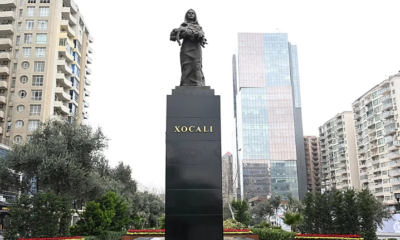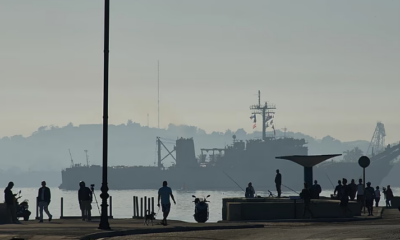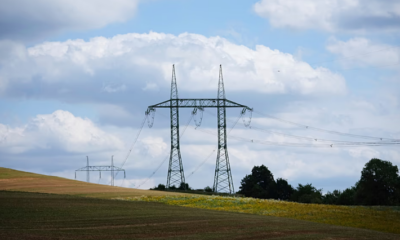News
EU Divided Over €140 Billion Reparations Loan for Ukraine Using Frozen Russian Assets
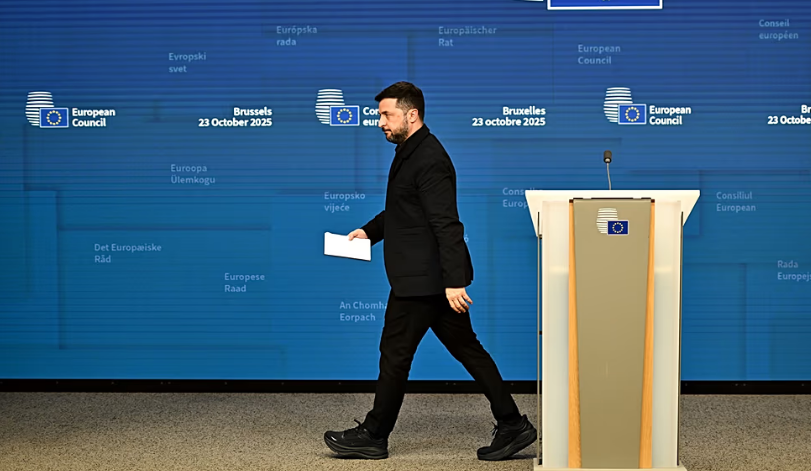
European Union leaders remain at odds over an ambitious plan to use frozen Russian assets to fund a €140 billion loan for Ukraine, after Belgium blocked the proposal during a summit in Brussels this week. The initiative, designed to finance Ukraine’s military and reconstruction needs for 2026 and 2027, has become a major test of Europe’s political unity and financial resolve amid waning U.S. support for Kyiv.
The proposal would see the EU issue a “reparations loan” backed by roughly €185 billion in immobilised Russian central bank assets held at Euroclear, a Brussels-based securities depository. The funds, frozen since 2022 under Western sanctions following Moscow’s full-scale invasion of Ukraine, currently generate billions in annual windfall profits for Belgium.
However, Belgian Prime Minister Bart De Wever halted progress, citing fears of Russian retaliation and potential legal fallout. Belgium maintains an investment treaty with Moscow that could expose it to international arbitration if the assets are transferred. “If you take the money from my country and it goes wrong, I am not able—and certainly not willing—to pay €140 billion,” De Wever said after the summit. “Those who support this decision must guarantee that the solidarity will be there if things go sour.”
Despite the setback, EU officials agree on the goal: to make Russia, not European taxpayers, pay for the destruction in Ukraine. What remains unresolved is how to do it legally and safely.
Under the plan, Euroclear would transfer the cash to the European Commission, which would then issue the €140 billion loan to Ukraine in tranches tied to spending conditions, such as using the funds to purchase European-made equipment. Ukraine would only begin repayment after Russia ends the war and agrees to pay reparations, allowing Euroclear to eventually reimburse Moscow—a structure Brussels insists does not amount to confiscation.
European Central Bank President Christine Lagarde has warned against any move that could be seen as seizing sovereign assets outright, but has indicated the reparations loan might be feasible with more technical safeguards. EU leaders are also calling for transparency about how much each member state holds in frozen Russian funds and how profits are being used.
Germany and the Netherlands expressed sympathy for Belgium’s concerns but stressed the need for shared risk across the bloc. Hungary has already said it will not participate. French President Emmanuel Macron said technical issues must be resolved but insisted the project remains “on the table.”
With the U.S. scaling back financial support, Europe faces mounting pressure to find long-term solutions. The European Commission is expected to present an updated proposal before the next summit in December, seen as the deadline for a breakthrough.
Ukrainian President Volodymyr Zelenskyy, addressing EU leaders by video, urged swift action. “Ukraine will need this funding at the very beginning of 2026,” he said. “Not everything depends on us—it’s a political decision.”
News
Cruise Passengers Stranded Amid Escalating Middle East Crisis
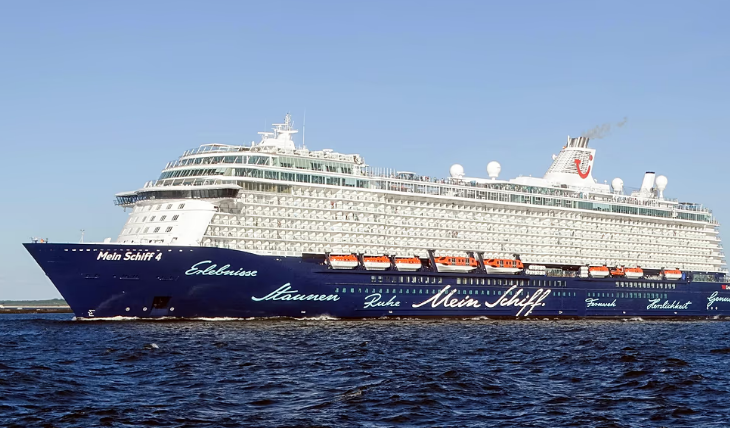
The Persian Gulf is currently characterised by hostilities. The Strait of Hormuz is closed to shipping, with only vessels connected to China or Russia allowed to pass. The escalating crisis in the region has left thousands of tourists stranded on cruise ships and disrupted air travel.
On Sunday afternoon, a missile struck the water near the Mein Schiff 4, operated by TUI Cruises, while the ship was docked in Abu Dhabi, United Arab Emirates. Clouds of black smoke were reported over the water, according to the Bild newspaper. The vessel carries approximately 2,500 passengers and 1,000 crew members, with many due to return to Germany from Dubai. The situation on board is tense, and it is not yet clear if anyone was injured.
Security measures on the ship remain strict. Passengers are prohibited from entering outside decks, are advised to avoid windows, and receive regular alerts on their smartphones about potential incoming missile threats.
A sister ship, Mein Schiff 5, berthed in Doha, Qatar, is also affected. Passengers attempting to fly home from Doha on Saturday were forced to return to the ship after flights were canceled. Many had already boarded aircraft and had to leave luggage at the airport, waiting around ten hours before being taken back to the ship in the evening.
Other cruise lines are similarly affected. Six vessels are currently docked across ports in Dubai, Abu Dhabi, and Doha. These include the MSC Euribia from MSC Cruises, the Celestyal Discovery and Celestyal Journey from Celestyal Cruises, and the Aroya from the Saudi operator Aroya Cruises.
The closure of airspace in multiple countries in the region has compounded the situation, preventing passengers from flying home. Thousands remain stranded, unsure when they will be able to continue their journeys or be evacuated safely.
The crisis follows US and Israeli strikes in the region on Saturday, which prompted retaliatory attacks by Iran targeting military positions in the Persian Gulf. Cruise passengers, many of whom expected a calm holiday, have instead faced a sudden escalation in regional tensions.
Authorities in ports and embassies are coordinating with shipping companies to maintain safety and provide updates, but the rapidly evolving security situation has made evacuation and travel plans uncertain. Tourists are advised to follow official guidance and avoid unnecessary movement on or around their vessels.
The disruption highlights the wider impact of escalating hostilities in the Gulf, affecting not only commercial shipping but also tourism and international travel. Passengers on affected cruise ships and flights face prolonged delays as authorities work to stabilize the situation and ensure safety in the region.
News
Azerbaijan Commemorates Khojaly Massacre with New Memorial and National Ceremony
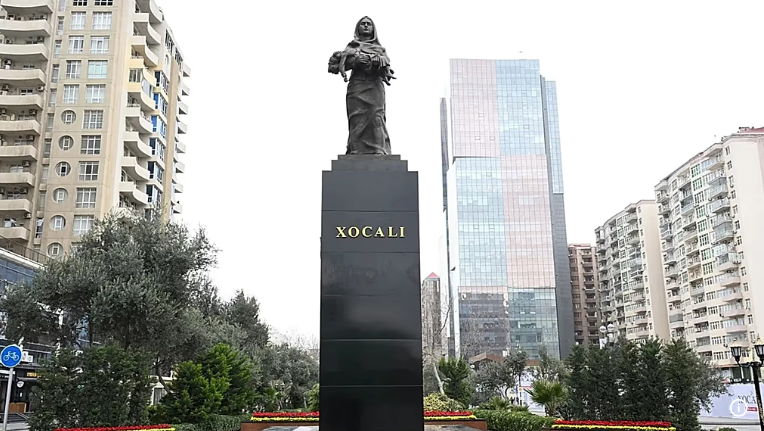
Azerbaijan held nationwide commemorations on Thursday to mourn the hundreds of civilians killed in February 1992 in the town of Khojaly during the Karabakh conflict with Armenia. President Ilham Aliyev led the ceremonies, inaugurating a new Khojaly Genocide Memorial Complex in Baku to honor the victims of what he described as “the greatest tragedy for the Azerbaijani people.”
Thousands of people gathered at the Khojaly Massacre Memorial in Baku for the National Day of Remembrance. A minute of silence was observed across the country as citizens paid tribute to those who lost their lives over 30 years ago.
Azerbaijani authorities state that 613 civilians, including women and children, were killed when Armenian forces, with the support of the former Soviet Union’s 366th Guards Motor Rifle Regiment, attacked Khojaly. Dozens more were reported missing or injured during the assault, which occurred amid the war between ethnic Armenian forces backed by Armenia and Azerbaijani troops over the Karabakh region and surrounding areas.
Human Rights Watch conducted its own investigation into the incident, attributing direct responsibility for the civilian deaths to Karabakh Armenian forces. Armenia has repeatedly denied the accusations, arguing that the reported death toll was exaggerated and that casualties resulted from fighting between the two sides.
Despite differing accounts, the Khojaly tragedy remains a deeply significant event in Azerbaijan’s collective memory. Commemorations continue to emphasize the human cost of the conflict and the impact on generations of Azerbaijanis.
This year’s ceremonies took place against the backdrop of a peace and reconciliation process between Azerbaijan and Armenia. Both nations have pledged to work toward a more stable and peaceful future following decades of conflict and suffering on both sides.
President Aliyev emphasized the importance of remembering the past while looking forward. The newly inaugurated memorial complex aims to provide a permanent site for reflection, ensuring that the victims of Khojaly are remembered by future generations.
The National Day of Remembrance has become a focal point for public reflection and national unity, drawing participants from across Azerbaijan. Observers note that the ceremonies serve both to honor the victims and to reinforce awareness of the historical and ongoing challenges in the Karabakh region.
Over 30 years after the massacre, Khojaly continues to hold a central place in Azerbaijani history. Thursday’s events highlighted the nation’s efforts to commemorate the past while supporting dialogue and cooperation with Armenia to foster lasting peace in the South Caucasus.
News
Four Killed After Clash Between Cuban Coast Guards and US-Registered Boat
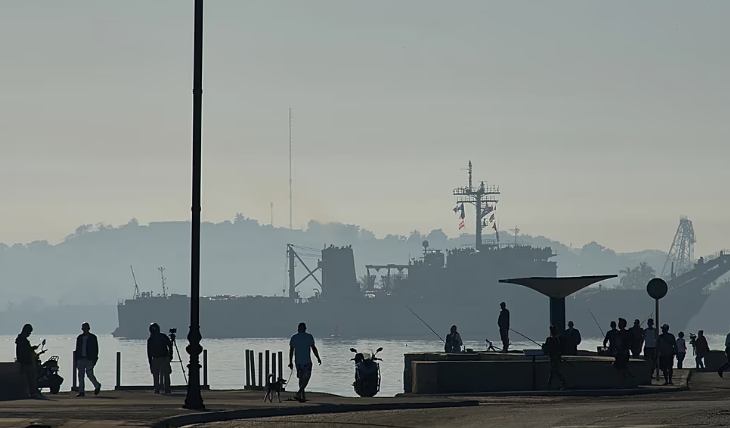
Cuban border guards shot and killed four people aboard a Florida-registered speedboat on Wednesday after the vessel allegedly failed to stop in Cuban territorial waters and opened fire on a patrol boat, authorities in Havana said.
In a statement, the Cuban Ministry of Interior said the boat was detected about one nautical mile from Falcones Cay in Villa Clara province. A patrol unit was dispatched to identify the vessel and its occupants. Officials said the speedboat refused to comply with orders and that gunfire broke out during the encounter.
According to the ministry, six other passengers were injured in the exchange. The commander of the Cuban patrol boat, which carried five crew members, was also wounded. Authorities said all injured individuals were taken to safety and received medical treatment.
Cuba’s government later stated that the 10 people on board were armed Cuban nationals residing in the United States who were attempting to enter the island to carry out what it described as terrorist acts. Officials added that most of the passengers had a history of criminal and violent activity.
Two of the passengers were identified as Amijail Sánchez González and Leordan Enrique Cruz Gómez, both of whom Cuban authorities say are wanted in connection with activities linked to terrorism. The government said it obtained details about those on board through questioning of detainees after the confrontation.
The ministry reaffirmed its commitment to defending the country’s sovereignty and territorial integrity against threats by land, sea or air.
In Washington, Marco Rubio said US officials were gathering information to determine whether the victims were American citizens or permanent residents. Speaking at the airport in Basseterre, Saint Kitts, where he was attending a regional summit with Caribbean leaders, Rubio said the United States would independently verify the facts.
He emphasised that the incident was not a US government operation and declined to speculate about the ownership of the boat or the intentions of those on board. Rubio said US authorities would establish what happened before deciding on any response.
The clash comes at a time of heightened tensions between Washington and Havana. Donald Trump recently imposed an oil blockade on Cuba, citing its support for Venezuela’s former president, Nicolás Maduro. The measures have cut off oil and financial flows from Venezuela to Cuba.
Cuban President Miguel Díaz-Canel has rejected US pressure, insisting that any dialogue must respect Cuba’s sovereignty. Cuban officials have criticised the oil restrictions, saying they are harming the island’s economy and public services.
The investigation into Wednesday’s shooting remains ongoing.
-

 Entertainment2 years ago
Entertainment2 years agoMeta Acquires Tilda Swinton VR Doc ‘Impulse: Playing With Reality’
-

 Business2 years ago
Business2 years agoSaudi Arabia’s Model for Sustainable Aviation Practices
-

 Business2 years ago
Business2 years agoRecent Developments in Small Business Taxes
-

 Home Improvement1 year ago
Home Improvement1 year agoEffective Drain Cleaning: A Key to a Healthy Plumbing System
-

 Politics2 years ago
Politics2 years agoWho was Ebrahim Raisi and his status in Iranian Politics?
-

 Business2 years ago
Business2 years agoCarrectly: Revolutionizing Car Care in Chicago
-

 Sports2 years ago
Sports2 years agoKeely Hodgkinson Wins Britain’s First Athletics Gold at Paris Olympics in 800m
-

 Business2 years ago
Business2 years agoSaudi Arabia: Foreign Direct Investment Rises by 5.6% in Q1



